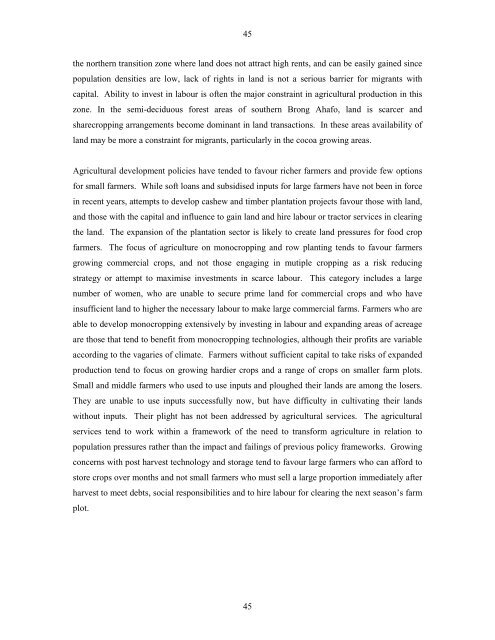Poverty Dimensions of Public Governance and Forest Management ...
Poverty Dimensions of Public Governance and Forest Management ...
Poverty Dimensions of Public Governance and Forest Management ...
Create successful ePaper yourself
Turn your PDF publications into a flip-book with our unique Google optimized e-Paper software.
45<br />
the northern transition zone where l<strong>and</strong> does not attract high rents, <strong>and</strong> can be easily gained since<br />
population densities are low, lack <strong>of</strong> rights in l<strong>and</strong> is not a serious barrier for migrants with<br />
capital. Ability to invest in labour is <strong>of</strong>ten the major constraint in agricultural production in this<br />
zone. In the semi-deciduous forest areas <strong>of</strong> southern Brong Ahafo, l<strong>and</strong> is scarcer <strong>and</strong><br />
sharecropping arrangements become dominant in l<strong>and</strong> transactions. In these areas availability <strong>of</strong><br />
l<strong>and</strong> may be more a constraint for migrants, particularly in the cocoa growing areas.<br />
Agricultural development policies have tended to favour richer farmers <strong>and</strong> provide few options<br />
for small farmers. While s<strong>of</strong>t loans <strong>and</strong> subsidised inputs for large farmers have not been in force<br />
in recent years, attempts to develop cashew <strong>and</strong> timber plantation projects favour those with l<strong>and</strong>,<br />
<strong>and</strong> those with the capital <strong>and</strong> influence to gain l<strong>and</strong> <strong>and</strong> hire labour or tractor services in clearing<br />
the l<strong>and</strong>. The expansion <strong>of</strong> the plantation sector is likely to create l<strong>and</strong> pressures for food crop<br />
farmers. The focus <strong>of</strong> agriculture on monocropping <strong>and</strong> row planting tends to favour farmers<br />
growing commercial crops, <strong>and</strong> not those engaging in mutiple cropping as a risk reducing<br />
strategy or attempt to maximise investments in scarce labour. This category includes a large<br />
number <strong>of</strong> women, who are unable to secure prime l<strong>and</strong> for commercial crops <strong>and</strong> who have<br />
insufficient l<strong>and</strong> to higher the necessary labour to make large commercial farms. Farmers who are<br />
able to develop monocropping extensively by investing in labour <strong>and</strong> exp<strong>and</strong>ing areas <strong>of</strong> acreage<br />
are those that tend to benefit from monocropping technologies, although their pr<strong>of</strong>its are variable<br />
according to the vagaries <strong>of</strong> climate. Farmers without sufficient capital to take risks <strong>of</strong> exp<strong>and</strong>ed<br />
production tend to focus on growing hardier crops <strong>and</strong> a range <strong>of</strong> crops on smaller farm plots.<br />
Small <strong>and</strong> middle farmers who used to use inputs <strong>and</strong> ploughed their l<strong>and</strong>s are among the losers.<br />
They are unable to use inputs successfully now, but have difficulty in cultivating their l<strong>and</strong>s<br />
without inputs. Their plight has not been addressed by agricultural services. The agricultural<br />
services tend to work within a framework <strong>of</strong> the need to transform agriculture in relation to<br />
population pressures rather than the impact <strong>and</strong> failings <strong>of</strong> previous policy frameworks. Growing<br />
concerns with post harvest technology <strong>and</strong> storage tend to favour large farmers who can afford to<br />
store crops over months <strong>and</strong> not small farmers who must sell a large proportion immediately after<br />
harvest to meet debts, social responsibilities <strong>and</strong> to hire labour for clearing the next season’s farm<br />
plot.<br />
45
















